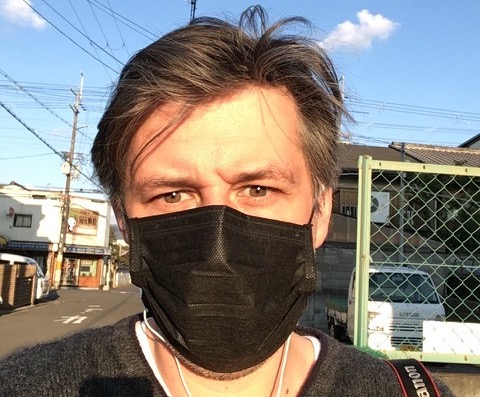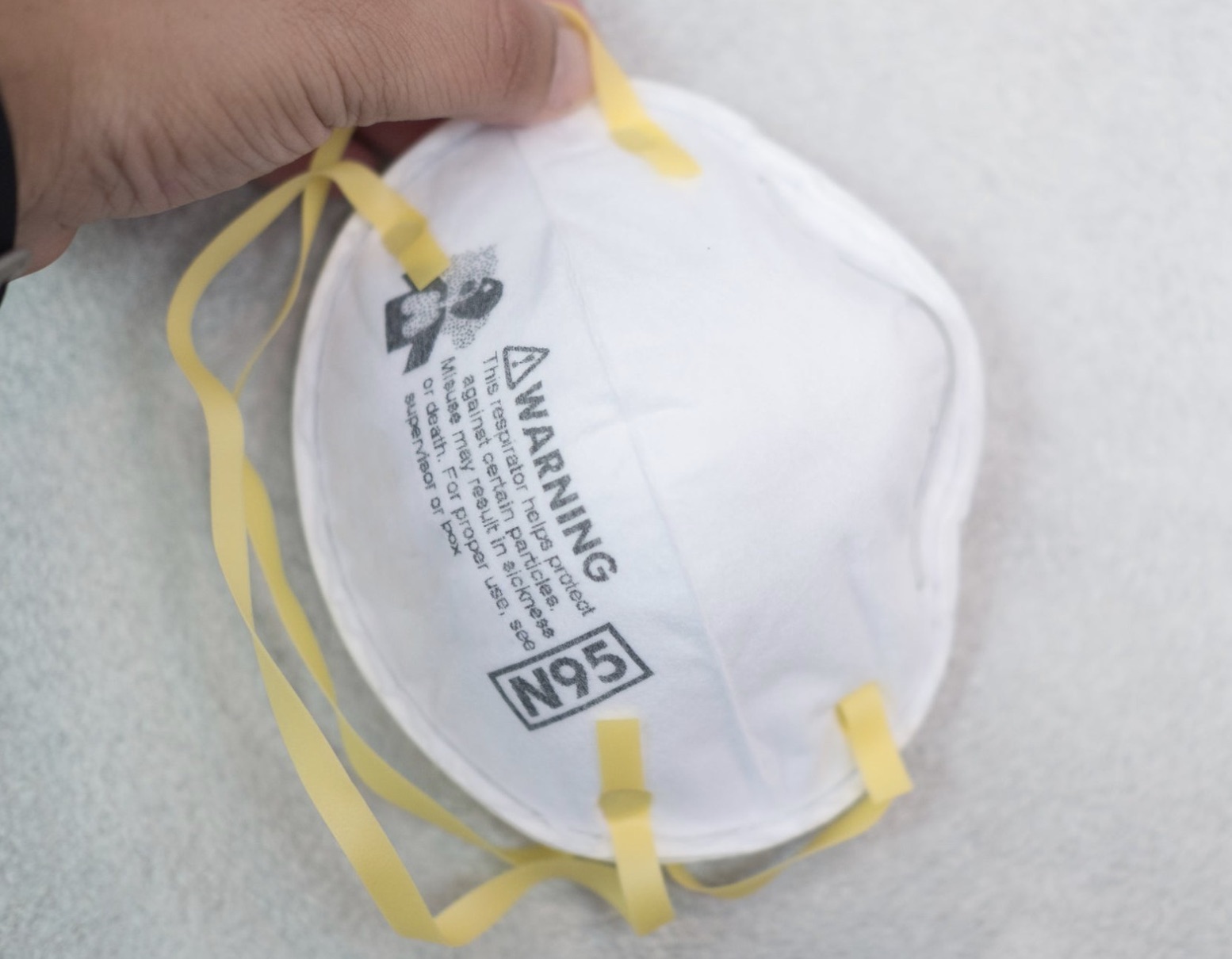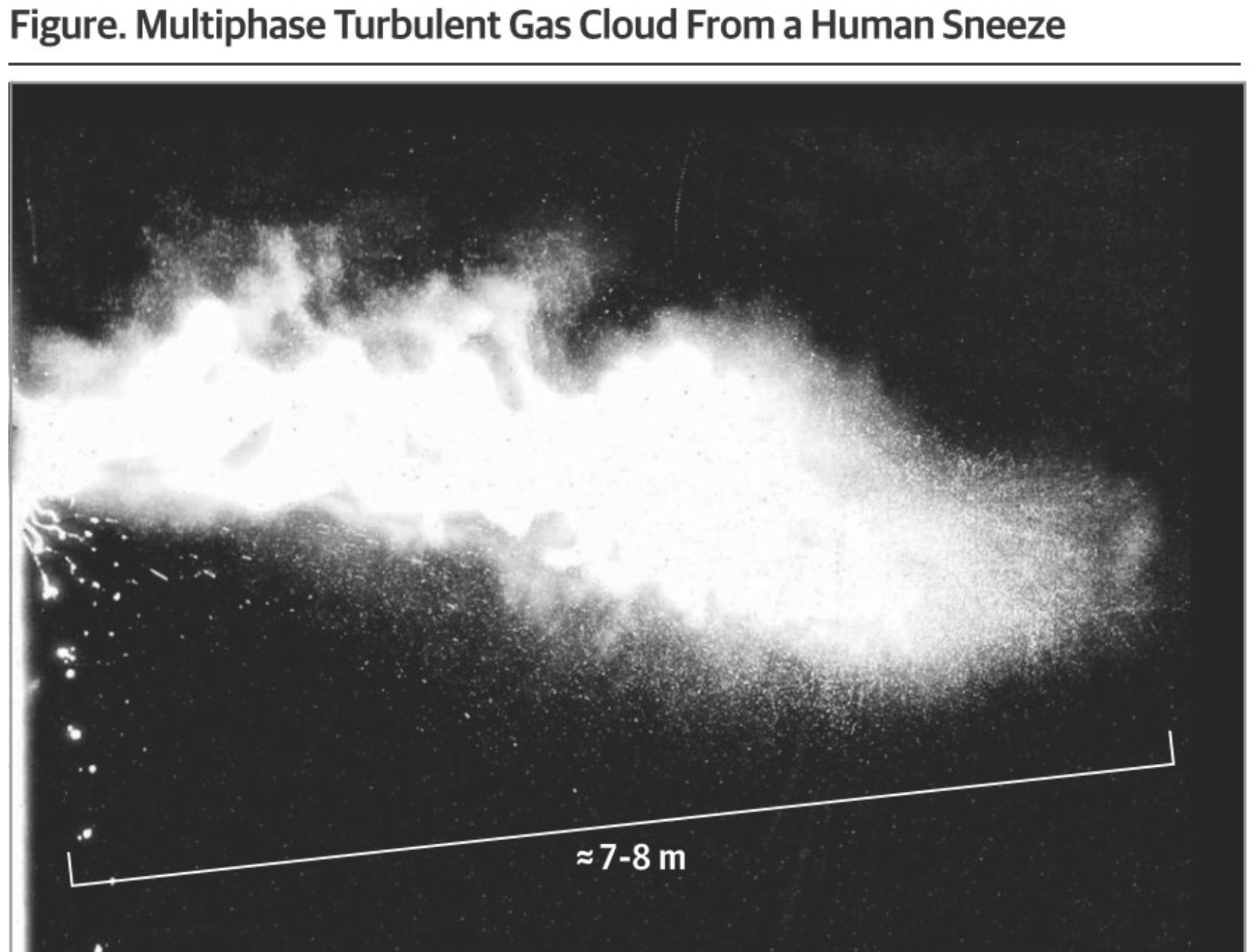
| « We Need A Massive Surveillance Program | J.D. Scholten on Coronavirus in Iowa » |

Let's talk about masks!
On Friday, the Centers for Disease Control recommended that every American wear a face covering when in public. Masks will be the hot, bold look for summer.
The medical evidence for the practice is overwhelming. The post-SARS countries in East Asia have known this for a long time, and America and Europe are finally coming around. I've put a bunch of resources about the medical benefits of mask wearing in a further reading section at the bottom of this post.
But in this essay, I want to persuade you not just to wear a mask, but to go beyond the new CDC guidelines and help make mask wearing a social norm. That means always wearing a mask when you go out in public, and becoming a pest and nuisance to the people in your life until they do the same.
Mask Types
Before I go further, it's really important to distinguish between two kinds of masks: N95 masks (the one on the left), and procedure masks (the ones on the right).


When I talk about mask use in this essay, I'll be referring exclusively to the second kind of mask, or its cloth equivalent.
If you have any N95 masks, you need to donate them to a hospital. These masks are lifesaving protective equipment for doctors and medical staff. They are in incredibly short supply. Wearing them in daily life is like wearing a fireman's coat instead of suntan lotion—it doesn't do much for you, and wastes an invaluable resource that could save the life of a first responder.
Depending on where you live, mass-produced procedure masks might also be in short supply. If your local hospital needs them, and you have some on hand, donate them too! You can easily make all the cloth or paper masks you need for your own use at home, using resources I'll link at the end of this essay.
Why we wear masks
In America, we still tend to think of face masks as a defensive shield to ward off illness. This is one reason there has been a run on respirators and hospital-grade masks. People treat it like a space helmet and want the strongest possible protection, doctors be damned.
But that is thinking about it backwards. The point of wearing a mask in public is not to protect yourself, but to protect other people from you. We know that many people who fall ill won't show symptoms during the time when they are most infectious. Some people may even remain asymptomatic through the whole course of the disease, never knowing they had it.
The safest thing to do is assume you're sick all the time, and wear the mask.
The job of protecting you, meanwhile, falls to everyone else! That's why it's so important that we adopt mask wearing as a social norm. When enough sick people wear masks, even of the most rudimentary kind, it becomes difficult for a disease like coronavirus to spread in the population.
In countries like Taiwan and Japan, even before this pandemic started, it was common for people to put on a mask on at the first sign of a cold, or to wear one at all times in the winter months, particularly on public transportation. It was a small courtesy to fellow passengers.
If you've never seen it before, a subway car full of people wearing surgical masks can be an arresting sight. In America, we still tend to associate face masks with hospitals and illness. But it only takes a short time for the practice to start feeling normal, and that's where we want to get to in the next couple of weeks across America and Europe.
By the end of the month, wearing a face mask should be like wearing a shirt—a routine social behavior that is expected of everyone and gets you weird looks if you don't do it.
So that's the main reason we need to wear masks—to protect others in case we are sick! But there are some other good reasons that get less attention. Hipster reasons! I've divided them here into two groups: the ways a mask helps you individually, and the ways it helps us collectively.
Here are the ways wearing a mask will help you as an individual:
- A mask is a barrier that keeps you from touching your nose and mouth. By now you've probably noticed how irresistibly drawn your hands are to your face, far more than you would have guessed possible before paying attention to it. Masks make it harder to indulge that habit, as well as other unconscious habits like nose-picking, nail-biting, chewing on pens, or licking your finger when you count money.
Wearing a mask is a mental reminder that things are not normal. Just like many religions ask believers to wear a special garment to keep them mindful of their duty to God, having a mask on your face can help you remember that you are in a situation that calls for special behavior.
- Masks are somewhat uncomfortable, a helpful feature when we're trying to limit time spent in public places. Wearing one out in the world gives you an incentive to get your business done quickly so you can go home, scrub your hands, and paw at your naked face in voluptuous luxury.
Masks can help you remember to wash your hands. If you form an association between handwashing and touching your mask, it becomes harder to forget to wash your hands when you come home and take your mask off.
Here are some ways that wearing masks helps other people:
- To repeat the most important point, masks reduce the quanity of virus-laden aerosols that come out of our mouth. The depends on what the mask is made of, how it's fitted, whether it's wet, and so on. But evidence is compelling (see below) that there is benefit to almost any kind of facial covering, even a scarf, compared to leaving your face bare. And when you cough or sneeze or talk, the mask reduces your epidemiological blast radius.
A mask is a visible public signal to strangers that you are trying to protect their health. No other intervention does this. It would be great if we had a soap that turned our hands gold for an hour, so everyone could admire our superb hand-washing technqiue. But all of the behaviors that benefit public health are invisible, with the exception of mask wearing.
If I see you with a mask on, it shows me you care about my health, and vice versa. This dramatically changes what it feels like to be in a public space. Other people no longer feel like an anonymous threat; they are now your teammates in a common struggle.
Universal mask use gives cover to sick people who, for whatever reason, need to be out in the world. If we only ask people to wear a mask when they have symptoms, they might as well put on a flashing neon sign that says INFECTED. Obviously, we want sick people to stay at home, but if they have to go out, they need be able to wear a mask without stigma.
If you're a nerd, you may recognize this as the same rationale that we give for mandating end-to-end encryption. Everyone needs to follow the safe behavior if we don't want the people who need its protection most to stand out.
Mask wearing prevents harrassment of people from other cultures who choose to wear a mask in public. Adopting a culture of mask wearing may not stop racist assholes, but it will at least make their targets less prominent.
Most importantly, a culture of mask wearing protects doctors, nurses, medical staff, and retail employees who are right now being punished for wearing masks at work, on the grounds that it alarms patients and clients. The same goes for clerks, delivery people, and anyone else who has to do a public-facing job. We want those people to be able to cover up, and for everyone they interact with to be covered up as well.
- Finally, because there is a mask shortage, learning to make masks at home will increase the supply of masks we can donate to hospitals, nursing homes, and anywhere else where personal protective equipment is in short supply. While these homemade masks may not be as good as specialized equipment, they are infinitely better than having nothing at all.
So I hope I've convinced you that creating a culture of mask wearing is one of the most effective things we can do, right now, to defeat coronavirus.
The next step is for all of us to make masks, wear masks, make a big ruckus about it on social media, and to put pressure on anyone who tries to impede people from wearing masks in the workplace.
It is important that we do this without exception. That means even if you're going for a jog in the woods, or you've recovered from coronavirus, or you've recently been thawed from a glacier and know you can't possibly be contagious, you still put a mask on.
The goal is not only to keep people safe, but to make it rare and weird to see anyone outside with a bare face.
We've done this kind of thing before in the name of public health! Spitting in the street used to be routine in America; now it's considered extremely rude. Public smoking is no longer tolerated, and smokers have been shamed and confined into furtive puffing, even though they're still a sixth of the populaton.
This doesn't mean we'll never see a stranger's bare face again. Once the immediate crisis is over, we can dial things down and adopt the same social norms as East Asia, where wearing a mask is an optional and unremarkable choice people make, one that tends to increase during cold and flu season, but is just a normal part of the social landscape.
But for the time being, let's get fundamentalist about it! Mask wearing is a powerful weapon, and if we combine it with hand washing, social distancing, staying home whenever possible, and not touching our face, we can really start to kick this virus's ass.
So please, commit with me to starting a lifesaving trend: always wear a face mask when you go out in public, with no exceptions, and make as many masks as you can for the people who need them.

Addendum I: How to make masks
Masks are in short supply, but you can MacGuyver one out of practically anything, including paper towels, cotton, vaccum cleaner bags. Expect the number of online tutorials to proliferate. Here are some I am partial to:
First, the official CDC guidelines on face coverings.
A lovely video tutorial from Hong Kong on how to make your own mask.
Face mask instructions from the Deaconess Hospital system in Indiana.
-
A tested Hong Kong Univeristy recipe for making a disposable paper mask, which gives a result 80-90% as effective as a premade procedure mask
-
Some fabric mask instructions from the Medical College of Wisconsin.
Addendum II: Further reading on mask use
This March 20 letter in the Lancet makes an unequivocal statement: “As evidence suggests COVID-19 could be transmitted before symptom onset, community transmission might be reduced if everyone, including people who have been infected but are asymptomatic and contagious, wear face masks.”
A study published in Nature on April 3, Respiratory virus shedding in exhaled breath and efficacy of face masks, tested viral transmission by having sick and healthy people exhale through a procedure mask for half an hour. It concludes that "surgical face masks could prevent transmission of human coronaviruses and influenza viruses from symptomatic individuals."
The Czech and Slovak governments have made face masks mandatory. Austria has made face masks compulsory in grocery stores and supermarkets.
An August 2013 study, Testing the Efficacy of Homemade Masks: Would They Protect in an Influenza Pandemic? in Disaster Medicine and Public Health Preparedness demonstrated the efficacy of homemade masks in reducing transmission of influenza virus.
For those who really want to dig in to the science, Adrien Burch wrote this terrific overview of face mask science, with abundant references, back when it was still a dangerously contrarian thing to do.
Zeynep Tufekci's March 17 New York Times op-ed on why public messaging on masks has been so misleading, Why Telling People They Don’t Need Masks Backfired.
- Wearing Masks Must Be a National Policy, an April 2 New York Times op-ed from four doctors making a forceful case for mask wearing. The op-ed includes multiple further references.
| « We Need A Massive Surveillance Program | J.D. Scholten on Coronavirus in Iowa » |
brevity is for the weak
Greatest Hits
The Alameda-Weehawken Burrito TunnelThe story of America's most awesome infrastructure project.
Argentina on Two Steaks A Day
Eating the happiest cows in the world
Scott and Scurvy
Why did 19th century explorers forget the simple cure for scurvy?
No Evidence of Disease
A cancer story with an unfortunate complication.
Controlled Tango Into Terrain
Trying to learn how to dance in Argentina
Dabblers and Blowhards
Calling out Paul Graham for a silly essay about painting
Attacked By Thugs
Warsaw police hijinks
Dating Without Kundera
Practical alternatives to the Slavic Dave Matthews
A Rocket To Nowhere
A Space Shuttle rant
Best Practices For Time Travelers
The story of John Titor, visitor from the future
100 Years Of Turbulence
The Wright Brothers and the harmful effects of patent law
Every Damn Thing
Your Host
Maciej Cegłowski
maciej @ ceglowski.com
Threat
Please ask permission before reprinting full-text posts or I will crush you.